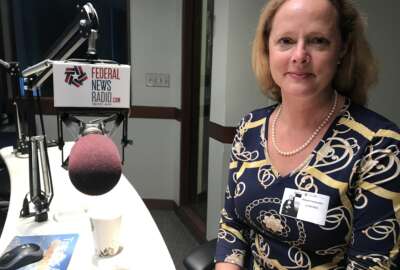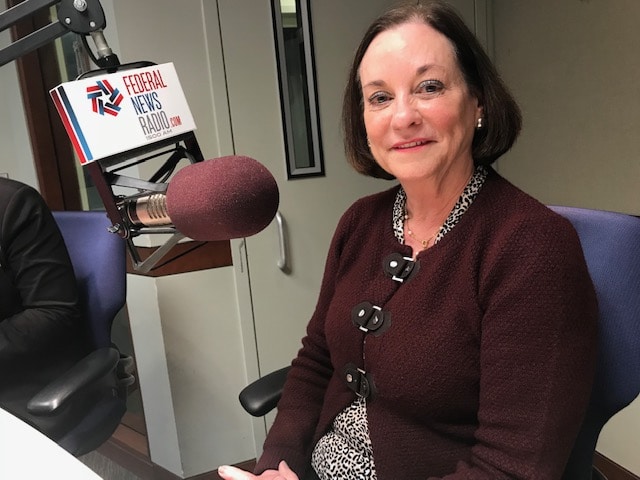

Kathleen McShane, who oversees the Small Business Administration's Women's Business Centers, enjoys mentoring women and encouraging them to take the next steps ...
Best listening experience is on Chrome, Firefox or Safari. Subscribe to Women of Washington’s audio interviews on Apple Podcasts or PodcastOne.
“My belief is: If you don’t ask, the answer is always no,” Kathy McShane said.

On this episode of Women of Washington, Gigi Schumm welcomed McShane, assistant administrator for the Office of Women’s Business Ownership at the Small Business Administration. She oversees centers around the country that help women launch or expand their businesses.
McShane said her goal is to provide women with the guidance — such as curriculum, networking opportunities and mentorship — and services they need to successfully launch.
“We very much empower our centers to do what I describe as ‘act locally while we’re thinking globally.’ They look at their market, they have a really keen insight into what the market needs and they offer services based upon the market need,” she said. “Sometimes they help women develop a business plan. Sometimes they [also] help women to actually put documentation together to get a loan.”
Networking, one-on-one counseling and helping women secure government contracts are services provided by the SBA office. One reason why many women decide to go into business for themselves is to find work-life balance, especially when they are also mothers, McShane said. Helping women find the right mindset early on is important to her and her team.
She outlined four differences between women and men when it comes to business ownership:
Two skills that helped McShane in her career were her open-mindedness and curiosity. Instead of pushing back against the unknown, she embraced the challenges that came with her different positions across the private, academic and civil service spheres.
After graduating from high school, McShane worked for payroll company ADP in New York before being recruited to American Express. Six months after starting her position — though she was told the training would last 18 months — her bosses were impressed with her work and transferred her to Boston to help turn a company around. From AE to CitiCorps Diner’s Club to Mastercard, McShane used her skills to help push growth and development.
Working for a company became more difficult when she became a parent. And she decided to pause and reassess her priorities. Her next step? Entrepreneurship. What started as a job-sharing environment turned into Ladies Launch Club.
Through this business, she was able to help other women find work-life balance by sharing responsibilities. Each woman was able to work part-time and spend time with their family, and still have the means to support their households.
“I’m a big believer in if you know what your objectives are, the rest falls into place,” she said.
The biggest obstacle for her, though, was finding mentors to help her and the resources to ensure it would succeed. She said her biggest inspiration was her mother.
“Frankly, my mother’s expectations were that I would succeed. However, she also encouraged me to march to my own drum. She didn’t try to suppress that,” McShane said. “She seemed to know intuitively that [it] would take me places. She said, ‘if you’re happy, you know at least one person’s happy. You cannot please everybody.’ She had strong ethics [but] was a very fair person. She expected us to do well and really encouraged us.”
In 2018, so many other women have turned into “solo-preneurs,” working out of their homes. McShane said this only works if you define your business hours, choose a specific work space (preferably not your dining room) and create a “do not interrupt” atmosphere. She said it’s important to run your own business the same way you would if you were not in a senior leadership position.
“I always tell people when they say to me, ‘Oh, as an entrepreneur you don’t have a boss.’ Well, guess what? I had eight clients at one time [so] I had eight bosses with different personalities, different approaches,” she said. “So we do have bosses.”

Despite having launched three businesses on her own, McShane still finds workshops and classes advantageous. In fact, her Ladies Launch Club business was directly influenced by an incubator franchise she took and then purchased with a similar name: Ladies Who Launch.
She loved her foray into the world of small business and felt she could use it in many different ways. Eventually, she joined the federal workforce to help on a larger scale.
What advice would she give to someone who wants to do something similar in their career?
“I would say be focused. However, while you’re being focused, make sure you’ve got antennas out everywhere and if something feels right, it probably is right,” she said. “Don’t take yourself so seriously. I believe having fun and working is so important, and I do not believe its not achievable.”
Copyright © 2024 Federal News Network. All rights reserved. This website is not intended for users located within the European Economic Area.
Steff Thomas is a digital editor at Federal News Network.
